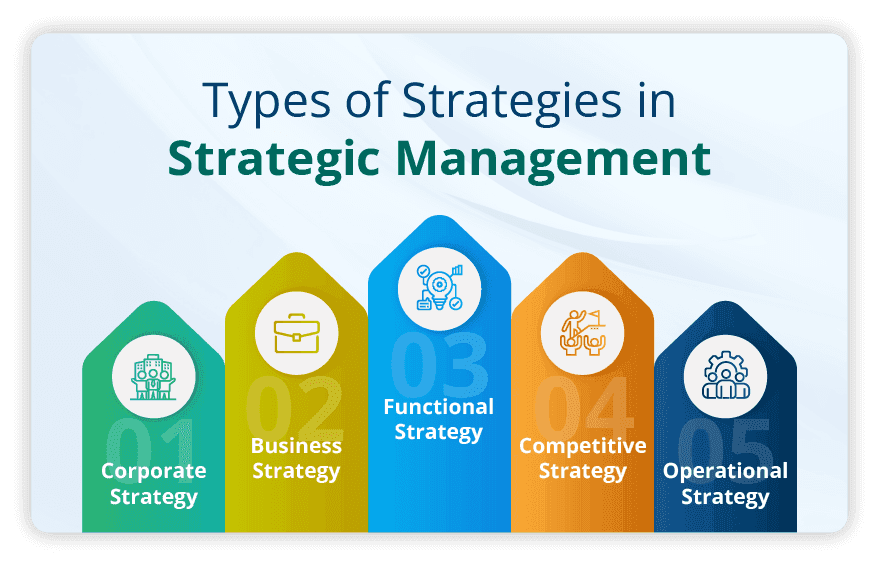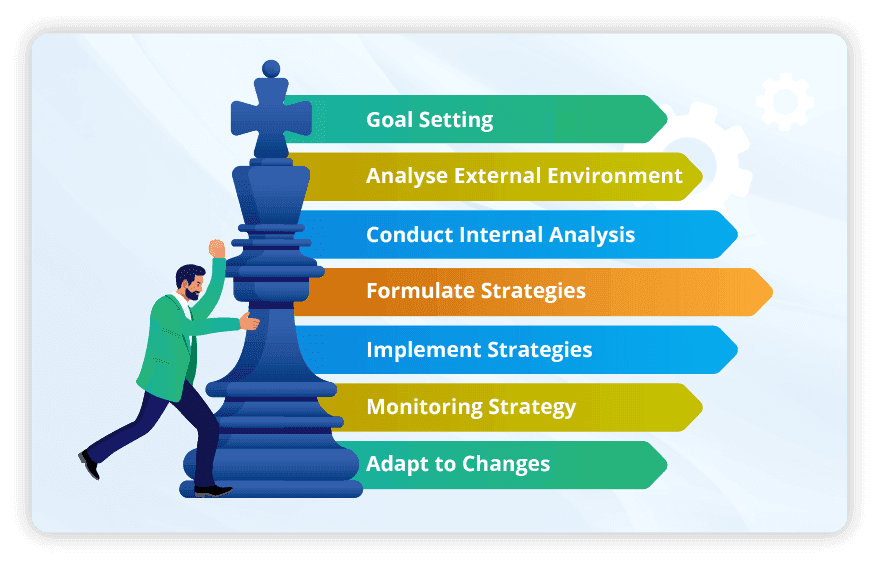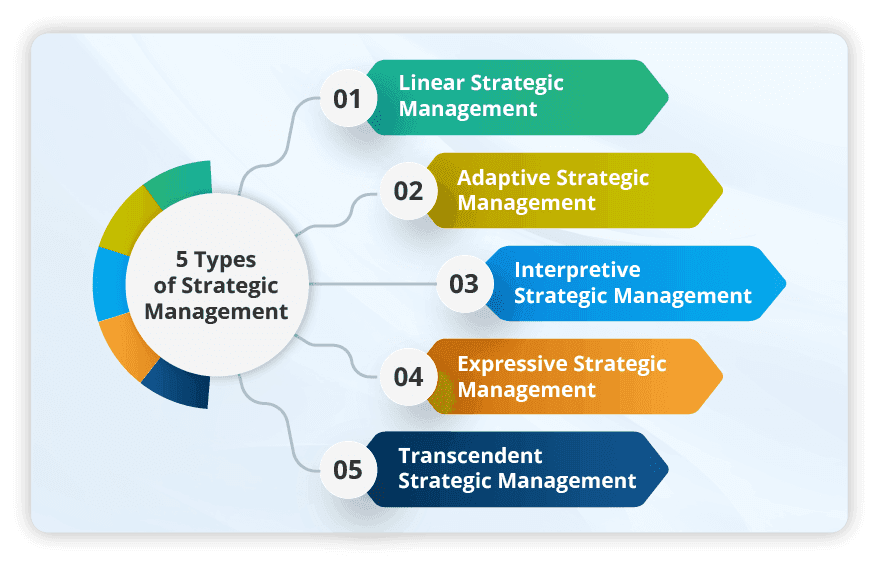What is the Strategic Management Process?
Strategic management involves systematically planning, implementing, and evaluating an organisation's objectives and initiatives. It is a dynamic framework that guides decision-making to achieve long-term success. The four key components of strategic management are goal setting, strategy formulation, strategy implementation, and strategy evaluation.
Strategic management generally involves two main approaches: prescriptive and descriptive.
The prescriptive approach outlines a structured methodology for crafting strategies, and the descriptive approach focuses on understanding how strategies are executed within the organisation. Together, the approaches provide a clear path from strategy formulation to implementation.
The Strategic Management process is an integral facet of effective organisational leadership that aligns organisational resources with external opportunities and threats.The principles of strategic management guide decision-making, emphasising organisational adaptability and transparency.
The principles of strategic management include:
- Focusing on the most important
- Leveraging strengths
- Open Communication
- Raising the Efficiency Level
- Remaining Flexible
- Investing in Outside Help
Furthermore, the dimensions of strategic management include:
- Leadership
- Culture and Values
- Strategic Thinking and Planning
- Strategic Alignment
- Strategic Performance Measurement
- Strategic Performance Management
- Process Improvement
- Sustainability of Strategic Management
Importance of Business Strategy in organisational success
A well-crafted business strategy can help you align your action plans, goals, and resources to achieve your bigger business objectives. It will provide a clear roadmap for achieving your goals in every process. It involves strategic planning, formulation, and execution to sustain a competitive advantage. Effective business strategies contribute to corporate growth, enhance performance, and drive innovation. It is the cornerstone for making informed decisions, adapting to market changes, and fostering a resilient and forward-thinking organisational culture. A robust business strategy is the catalyst for achieving and sustaining success in today's dynamic business environment.
Types of Strategies in Strategic Management

- Corporate Strategy: Corporate strategy involves decision-making at the highest level of the organisation, determining the overall direction and scope to achieve long-term objectives. It sets strategic goals, motivates the employees and establishes business values to achieve its objectives.
- Business Strategy: Business-level strategy focuses on the overall decisions taken by an organisation to achieve its bigger vision. It involves decisions related to positioning, differentiation, and gaining a competitive advantage.
- Functional Strategy: Functional-level strategy concentrates on the action plans for specific business functioning areas like marketing, operations, or finance. It aims to optimise each function's contribution to the overall business strategy and goals.
- Competitive Strategy: The competitive strategy refers to a set of policies and procedures organisations use to stay ahead within their industry. They can choose between cost leadership, differentiation, or focus to achieve a competitive edge.
- Operational Strategy: Operational strategy deals with the day-to-day activities and processes contributing to the overall business strategy. It involves optimising internal operations, resource allocation, and efficiency to support the achievement of strategic goals.
How does Strategic Management work?

Let's take a look at the seven steps in the strategic management process, as outlined in the strategic management model:
- Goal Setting: When initiating the strategic management process, it is necessary to establish clear and achievable goals that align with the organisational vision and mission. This sets the overarching direction and purpose, providing a foundation for strategic decision-making.
- Analyse External Environment: Strategic management thoroughly analyses the external environment, including market trends, competition, and potential opportunities and threats. This step is important to ensure the strategy aligns with the current business landscape.
- Conduct Internal Analysis: Organisations evaluate their internal strengths and weaknesses. This includes assessing resources, capabilities, and core competencies to identify areas where the organisation excels or needs improvement.
- Formulate Strategies: Organisations develop an adaptive strategy based on the analysed data, ensuring it addresses challenges and leverages opportunities in the business environment. These strategies may include business-level, corporate-level, and functional-level strategies tailored to the organisation's objectives.
- Implement Strategies: The next step involves putting the formulated strategies into action. The formulated strategy can be executed by allocating resources, aligning teams, and integrating the plan into day-to-day operations to achieve the established goals.
- Monitoring Strategy: Continuous evaluation of performance against strategic goals is crucial. This step involves monitoring Key Performance Indicators (KPIs) to assess the effectiveness of implemented strategies.
- Adapt to Changes: Strategic management is an iterative process, and organisations must remain adaptable. This step involves adjusting strategies based on changing internal and external factors, ensuring continued alignment with organisational goals.
What are the financial and non-financial benefits of strategic management?
➤ Financial Benefits of Strategic Management
- Increased Profitability: Strategic management improves financial performance by aligning business activities with long-term objectives, increasing profitability.
- Cost Efficiency: Organisations can identify cost-saving opportunities through strategic planning and resource optimisation, enhancing overall cost efficiency.
- Better Resource Allocation: Strategic management helps allocate resources effectively, ensuring financial investments are directed towards initiatives aligning with organisational goals.
- Enhanced Return on Investment (ROI): Strategic management ensures that investments yield higher returns by focusing on sustainable value and competitive advantage initiatives.
➤ Non-Financial Benefits of Strategic Management
- Improved Organisational Alignment: Strategic management fosters alignment between organisational goals and day-to-day activities, ensuring that every effort contributes to the overall mission.
- Enhanced Decision-Making: A clear strategy provides a framework for decision-making, enabling quick and informed choices that align with long-term objectives.
- Employee Engagement and Satisfaction: Organisations with clear strategic goals have more engaged and satisfied employees, leading to a positive workplace culture.
- Customer Satisfaction and Loyalty: By aligning strategies with customer needs, organisations can enhance customer satisfaction and build long-term loyalty, contributing to brand reputation.
- Risk Management: Strategic management involves proactive risk assessment and mitigation, reducing the impact of uncertainties and enhancing overall resilience.
How do Strategic Management frameworks guide decision-making in businesses?
Strategic management frameworks guide business decision-making by providing structured methodologies and models that help organisations analyse, formulate, and implement effective strategies. These frameworks offer a systematic approach to decision-making, ensuring alignment with organisational goals and addressing the complexities of the business environment. Strategic management frameworks analyse internal and external aspects that affect organisational growth and help gain a competitive advantage.
Strategic Management Frameworks include:
- SWOT Analysis: SWOT analysis assesses an organisation's Strengths, Weaknesses, Opportunities, and Threats, aiding decision-makers in identifying strategic priorities.
- PESTLE Analysis: PESTLE analysis evaluates Political, Economic, Social, Technological, Legal, and Environmental factors, providing insights into external influences on decision-making.
- Porter's Five Forces: Porter's Five Forces model analyses the competitive forces within an industry, helping businesses make informed decisions regarding market entry, supplier power, threat of substitution, threat of new entry and competition.
- BCG Matrix: The BCG Matrix categorises a company's product portfolio into Stars, Cash Cows, Question Marks, and Dogs, guiding resource allocation and investment decisions.
- Ansoff Matrix: The Ansoff Matrix explores market and product expansion strategies, assisting in decision-making regarding diversification, market penetration, market development and product development.
- Balanced Scorecard: The Balanced Scorecard aligns business activities with the organisation's strategy, providing a holistic view of performance through financial and non-financial metrics.
- Blue Ocean Strategy: Blue Ocean Strategy creates an uncontested market space, guiding decisions that differentiate a company from competitors and generate innovative value. It ultimately creates new market opportunities by generating new demand in markets.
- Scenario Planning: Scenario Planning involves creating multiple scenarios, helping organisations anticipate uncertainties and make decisions that align with possibilities in future.
- McKinsey Horizon model: McKinsey's Strategic Horizons categorises business initiatives into three horizons. It includes sustaining and protecting the fundamental business, nurturing new businesses and establishing an innovative and unique business. This framework balances short-term objectives with long-term innovation, guiding organisations comprehensively in strategic planning.
- Hoshin Kanri X Matrix: The Hoshin Kanri X Matrix is a strategic management tool that visually aligns goals, strategies, and Key Performance Indicators (KPIs). It facilitates communication and execution by linking organisational objectives to departmental plans, ensuring a cohesive approach to strategic initiatives.
- Value Chain Analysis: Value Chain Analysis evaluates a company's primary and support activities, identifying cost reduction and value creation areas to aid decision-making.
How is Strategic Management different from other types of management?
Strategic management stands apart from other management approaches by focusing on long-term planning, goal-setting, and aligning organisational activities with a comprehensive strategy. Unlike traditional management, which may concentrate on day-to-day operations, strategic management emphasises the formulation and execution of strategies that encompass areas such as business strategy, strategic planning, and strategic goals and objectives. This approach involves a proactive analysis of the external environment and internal capabilities, contributing to a more adaptable and forward-thinking organisational culture. Strategic management also diverges from operational management by emphasising continuous evaluation, adaptation to changes, and the iterative nature of the strategic planning process. It serves as a dynamic framework that ensures an organisation's competitiveness and sustainability in a rapidly evolving business landscape.
5 Types of Strategic Management

- Linear Strategic Management: This conventional strategy relies on logical and rational decision-making processes to effectively respond to unexpected changes. It involves analysing strengths and weaknesses, planning rational responses, and implementing tactics such as improved marketing and enhanced customer service.
- Adaptive Strategic Management: Focused on continual improvement, adaptive strategic management enables organisations to respond to shifts by iteratively updating their strategies. Advantages gained through adaptation are temporary and require ongoing experimentation to stay ahead of competitors.
- Interpretive Strategic Management: This approach uses an organisation's mission and values as a decision-making framework, ensuring alignment with overall goals. Interpretive strategic management fosters innovation by viewing decision-making as an ongoing, flexible process, promoting adaptation based on continuous insights.
- Expressive Strategic Management: An evolved approach combining adaptive and interpretive strategies, expressive strategic management proactively adapts to changes while upholding and communicating the organisation's mission and vision. Effective implementation allows organisations to capitalise on emerging trends while staying true to their core values.
- Transcendent Strategic Management: The highest level of strategic management is transcendent strategy, which incorporates linear, adaptive, interpretive, and expressive management strengths to provide a comprehensive approach to organisational strategy.
What industries use Strategic Management?
Strategic management is a versatile approach utilised across diverse industries for sustained success. Technology navigates rapid advancements and consumer shifts, fostering innovation. In healthcare, it optimises patient care and addresses regulatory changes. The
